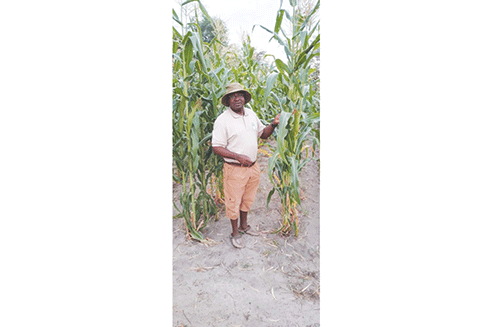KATIMA MULILO – Maiba Saisai has one of the most inspiring success stories of small-scale horticulture farming.
Saisai, who hails from a rural farming family in the Izimwe village, has turned his 2.4 hectares of productive agricultural land in Kabbe South of the Zambezi region into a profitable venture since 2004 through his hard work and dedication.
“Farming is charity. As one grows, you find your parents doing it as a source of food at home. My parents were hunter-gatherers. They practised agronomic farming, and I relate it to charity. We also learned agriculture in school. We had to do gardening as an agricultural subject,” he stated.
Saisai grows various crops such as maize, pumpkins, tomatoes, lettuce, cabbage, spinach, cucumbers, chilies, mangoes and green peppers.
“We have enough farming land in my village, measuring up to 10 hectares. I use organic fertilisers and manure for my plants, which I take from my kraal. With food production, you will never go wrong because everyone wants food. We just need to make the land pregnant and produce food. If you let the land lie idle, you will be poor and hungry,” he stressed.
He planted maize last September, and is currently harvesting and selling into the local market.
His clientele are lodges, individuals, schools and food vendors, amongst other consumers.
Saisai has also ventured into poultry and livestock farming at his place, which is called the Chenchenche horticulture unit, situated in his village of Kapolota in the Izimwe area.
This method, he believes, is sustainable and environmentally friendly to agriculture, which prioritises the health and well being of both consumers and the environment.
His farming dream started during his secondary education in the early 90s, when he would take seeds home from town and plant them.
The farming passion grew over the years. In 2006, he ventured into horticulture farming to raise an income to support his family.
“I developed a passion for horticulture, and started farming on 240 square metres of land. At the time, I sourced water from a concrete water well that was eight metres deep. I live a life of trekking. During winter, we trek down to the river with our livestock. When we trek to the river with the livestock, the elephants from the Chobe National Park would destroy the infrastructure at my farming camp.
It was a challenge. I then decided to mitigate these challenges by starting a garden and hired someone who lives there. There were sporadic floods, and people in relocation camps needed food,” the farmer explained.
He grabbed the opportunity, and started selling his produce such as maize to the needy relocated residents.
He also participated in an agricultural show in 2007, where he scooped an award for displaying quality organic produce.
“Agribusiness is a risky business. I am in an area adjacent to Chobe. There are wild animals such as elephants, and birds. You must put input to mitigate the challenges you face. You must buy medicine, which can be costly. If you have a dream, you can’t waver. Land should not be idle, even small land, to enhance food security. Our forefathers worked and produced food,” he stated.
Saisai first built a concrete water well to sustain his farm, although elephants would often visit his farm camps and destroy properties.
“I used to support flood victims in the relocation camps. Due to my hard work. I was nominated for supporting people in relocation camps, and I was advised to apply for water installation. This was a golden opportunity to upgrade my water source. I benefited from a grant of N$50 000 from the Zambezi Regional Council, and used it to install a borehole as this was my dream to have my own irrigation system,” Saisai beamed.
He then expanded his farming unit, as he now owns two separate boreholes.
– anakale@nepc.com.na



